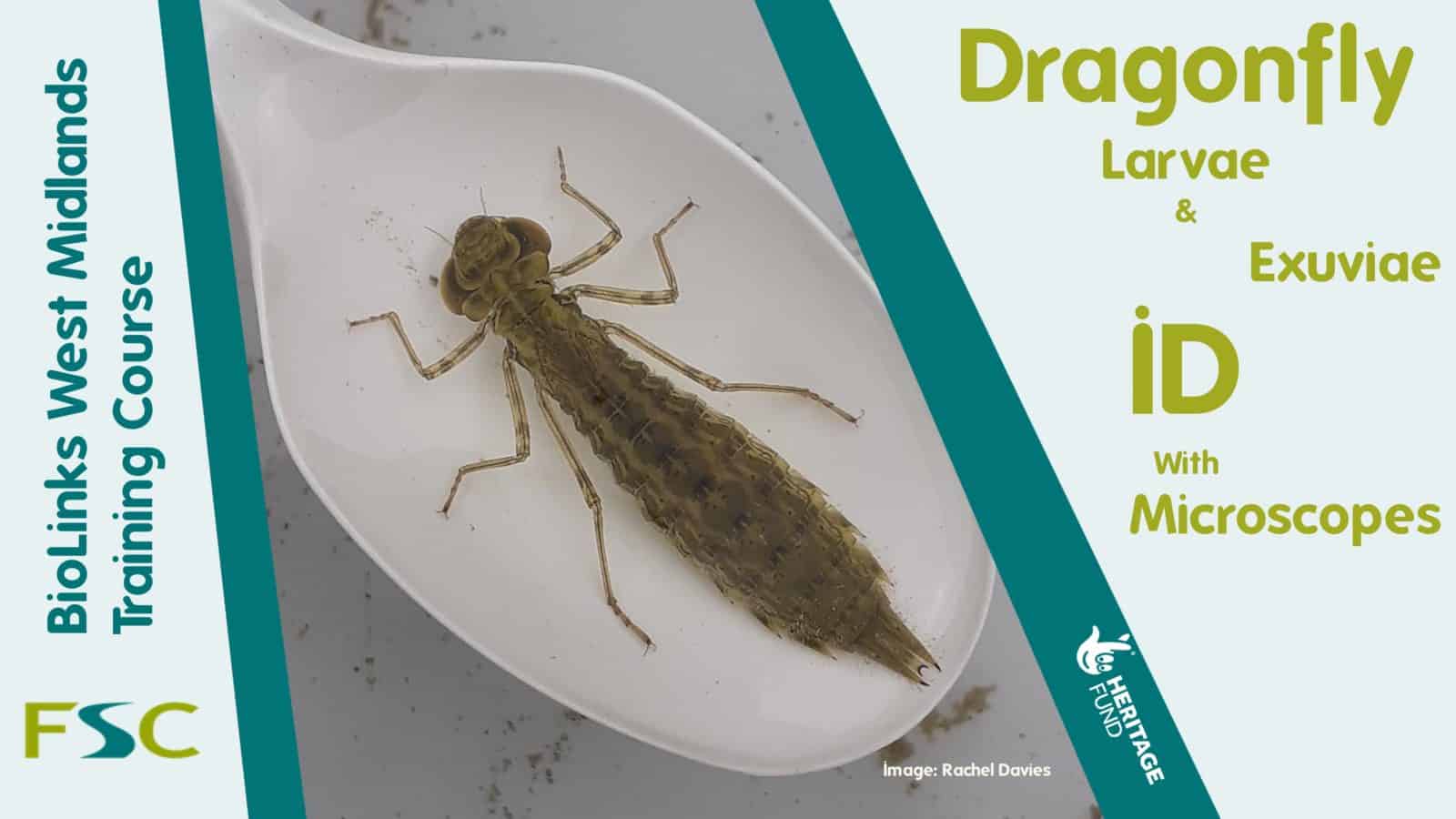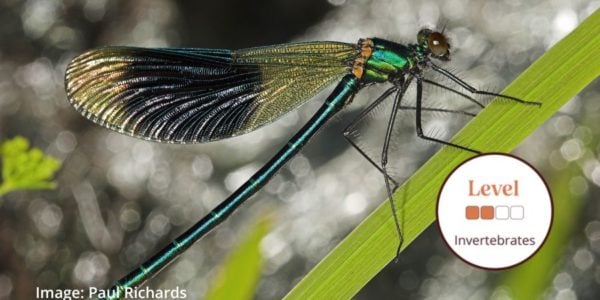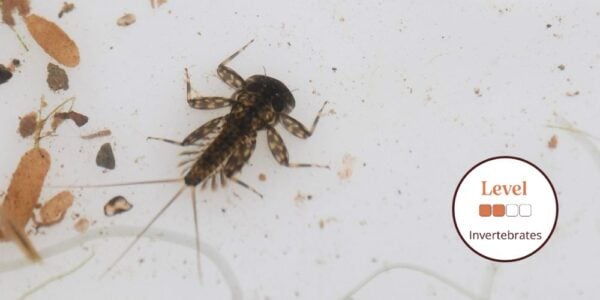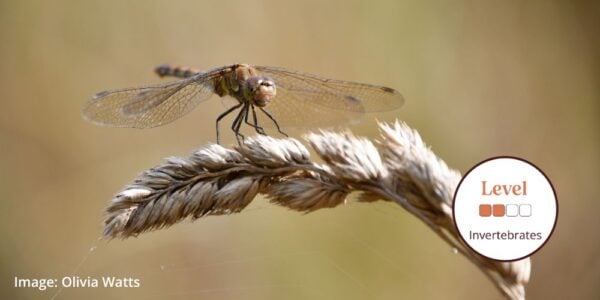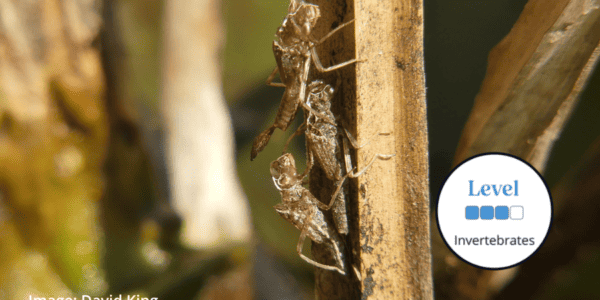There are around 50 species of dragonfly and damselfly found in the UK. Dragonflies and damselflies are a popular group among entomologists and are often considered one of the entry-level groups for new recorders, largely due to the fantastic identification resources available for all life stages. Many recorders start by recording adults, but if you are thinking of delving into the identification of dragonfly and damselfly larvae or exuviae in the UK this is the ideal course.
Aimed at beginners the course commences with an introduction to dragonfly larvae and the part they play in the dragonfly lifecycle. Participants will then be introduced to the morphological features used to identify specimens and an indoor practical workshop then focuses on the identification of exuviae. Using the ‘Field Guide to the Larvae and Exuviae of British Dragonflies- Steve Cham’, you’ll examine and identify a wide variety of different species, including both common species and rarer ones that can be trickier to find.
After lunch we will focus on larvae, dipping in the field centre pond and (if not too cold!) hopefully finding some specimens enabling us to practice some hands-on identification. The afternoon will be completed by returning to the classroom to discuss the importance of building your own reference collection in enabling you to make and submit accurate biological records.
Through a combination of taught classroom content and lab-based and outdoor practical sessions, learners will gain confidence in using the identification key and preserved specimens to identify dragonfly and damselfly larvae and exuviae to species level.
NB. ‘Field Guide to the larvae and exuviae of British Dragonflies- Steve Cham’ will be used throughout the day. Copies will be available to borrow and the tutor will also have copies available for sale at £7.50 (cash/cheque only).
- Certificate upon course completion.
- Please email [email protected] if you have any questions.
- Please note that this course will not involve using specimens that have been killed and preserved.
This course is aimed at adults only and course attendees must be at least 18 years old in order to attend.
What will be covered during this course?
- The external (morphological) features used in larvae and exuviae identification
- Practical experience using the ‘Field Guide to the Larvae and Exuviae of British Dragonflies’ by Steve Cham to determine specimens accurately to species level
- Practical experience observing larvae and exuviae ID features using a microscope
- Guidance on how to take your interest further and contribute to the British Dragonfly Society Recording Scheme
See the ‘Example Timetable’, ‘What’s Included’ and ‘Before You Attend’ sections below for more information about this course.
Course Fees
Subsidised Price: £10 Subsidised by the FSC BioLinks project for non-professionals eg. volunteers, biological recorders, wildlife gardeners, amateur naturalists and students.Available to UK residents only. Select ‘Attendee Subsidised: In Person’
Regular Price: £75 For professionals and residents outside of England. Select ‘Attendee: In Person’. Sold Out
Tutor: Sue Rees-Evans
Sue Rees Evans is the Shropshire County recorder for Dragonflies and the Odonata Tsar for the Shropshire Ecological Data Network. Sue has also written and manages the Shropshire Dragonflies website which serves as an online atlas and hosts the Shropshire Dragonfly Watch flight season blog. With a real enthusiasm for hands on teaching, Sue has taught numerous courses on Dragonfly and Damselfly identification over the last 10 years for the FSC, various Wildlife Trusts, the National Trust and numerous projects such as Biolinks, Invertebrate Challenge and Cold-blooded and Spineless. .Covid Measures
In order to keep our customers and staff safe, we ask that anyone attending our centres:
- Wears a face covering when in shared indoor space (unless exempt).
- Maintains social distancing.
- Cleans their hands regularly.
- Takes a Covid-19 test before they arrive.
Book with Confidence
We understand the difficulties of making plans in the current situation when guidelines continue to change, and insurance conditions are being tightened. In response, we will continue to offer additional flexibility. Find out more here
Example Timetable
- Please arrive in time for the course to start promptly at 10:00 am.
- Refreshments will be available from 9.45 am.
- The course will end at 4:00 pm.
What's Included
- 6 hours of tuition.
- Certificate of attendance.
- Access to a microscope, identification resources and specimens.
Bursaries and Subsidies
FSC BioLinks
FSC BioLinks is an exciting project for FSC in the South East and West Midlands, bringing together existing volunteers with skills in biological recording and identification, and new volunteers.
This project provides subsidised training courses, learning opportunities and digital tools focussed on invertebrate identification for anyone involved or interested in biological recording, to build and strengthen the community.
Invertebrates provide us with many useful ecosystem services, like pollination and decomposition, which we cannot survive without but their numbers are declining. Few people know how to identify or record invertebrates meaning there is a lack of data.
We are delighted to have been awarded a grant of £1.23 million from the National Lottery Heritage Fund for this project.
Before You Attend
Getting to FSC Preston Montford
FSC Preston Montford, Montford Bridge, Shrewsbury, SY4 1DX
- By Road: From the A5, take the roundabout exit signposted to Mid-Wales and Welshpool (A458). One mile along this road, turn right onto B4473, we are located on the left after approx ½ mile. SAT NAV: SY4 1DX
- By Bus or Train: Shrewsbury stations; a pick up is available by prior arrangement.
What to bring
- Notebook and pencil
- Lunch
- Suitable clothing (warm clothes, waterproofs) and suitable footwear (walking boots or wellies) for the outdoor practical
- If you have your own copy of the 'Field Guide to the Larvae and Exuviae of British Dragonflies - Steve Cham' bring it with you so that you can make notes in your own copy.
- Any dragonfly or damselfly exuviae specimens that you'd like verified (tutor availability during the course permitting)
Please note that this course will not involve using specimens that have been killed and preserved.
There will be a member of staff with first aid training and access to a first aid kit on site. If you have special medical requirements please let us know as soon as possible so we can plan the course.
Sorry this course has ended

